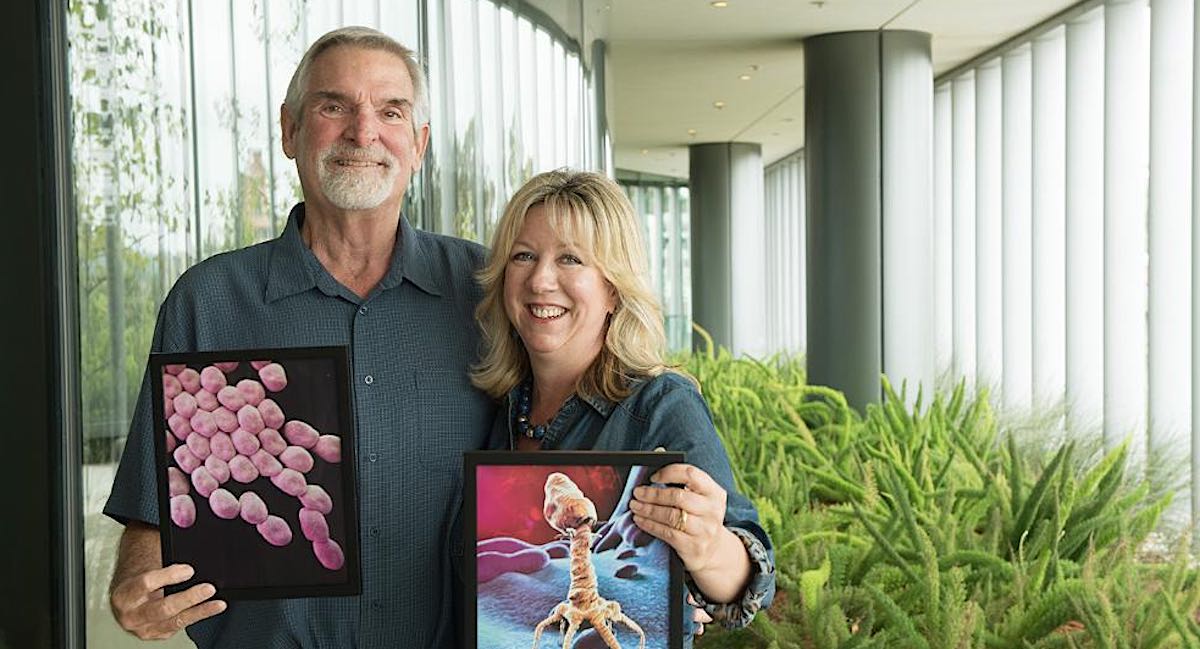
www.goodnewsnetwork.org
When Antibiotics Failed, She Found a Natural Enemy of Superbug Bacteria to Save Husband's Life
Her husband was dying from a bacterial superbug, but Steffanie Strathdee, an epidemiologist, found the needle in a haystack to cure him.
Social & Lifestyle
Tom Patterson was dying in a U.S. hospital from a massive bacterial infection he’d contracted while traveling in Egypt. Doctors gave him a prognosis of days.
Fortunately, his wife, Steffanie Strathdee, happened to be an infectious disease epidemiologist, who was not going to give up searching for the needle in a haystack required to cure him.
Strathdee spent agonizing months in a bedside vigil at the UC San Diego hospital in 2016 where she served as associate dean of global health science. “I had this conversation that nobody ever wants to have with their loved one,” she recalled during a health and wellness event co-sponsored by CNN.
“I said, ‘Honey, we’re running out of time. I need to know if you want to live. I don’t even know if you can hear me but if you can hear me and you want to live, please squeeze my hand.’ I waited and waited, and all of a sudden, he squeezed really hard.”
From that moment, Strathdee was determined to find a cure—even if it meant turning conventional disease intervention on its head.
After sifting through mountains of medical research, she finally found something that gave her hope: phage treatment. Phages are naturally occurring viruses that literally eat bacteria.
Strathdee reached out to the Tbilisi, Georgia researcher whose work she’d discovered online and learned that although the protocol isn’t mainstream, long-term studies conducted in the U.S. and abroad had already indicated the treatment showed promising efficacy in some cases.
However, with more than 10 million-trillion-trillion unique phages on the planet, identifying a handful that specifically fed on the Acinetobacter baumannii afflicting Tom was a task akin to finding one tiny star in a huge galaxy.
The deadly superbug is nicknamed Iraqibacter because wounded combat troops sometimes contracted it in Iraq—and it ranks No. 1 on the World Health Organization’s list of dangerous pathogens. Undaunted, Strathdee quickly began networking to get Tom the treatment he so desperately needed to survive.
Her first task was appealing to scientists to track down and purify samples of phages that fed on the specific strain of bacteria that was killing Tom. Texas A&M University biochemist Ryland Young, who’s been tracking phages for more than four and a half decades, was eager to help. Researchers from the U.S. Navy soon signed up for the mission as well.
Strathdee’s plea to the FDA to fast-track a “compassionate use” order allowing doctors to implement an experimental treatment was granted in record time. A scant three weeks later, Tom was injected with his first intravenous dose of a purified “phage cocktail” from the team at Texas A&M. Seeing no negative effects, he received his second IV dose, courtesy of the U.S. Navy, two days later.
The miraculous results were like something straight out of an episode of House (minus the fractious Hugh Laurie character, of course). Not long after his second phage IV push, Tom, who had become comatose, was able to raise his head and kiss his daughter’s hand.
A Promising Phuture for Phage
Tom Patterson is thought to be the first U.S. patient with a systemic superbug infection to be successfully treated via intravenous phage therapy.
Since Patterson’s recovery six years ago, in conjunction with Dr. Robert “Chip” Schooley, the eminent UC San Diego infectious disease specialist who spearheaded her husband’s care, Strathdee has opened the Center for Innovative Phage Applications and Therapeutics (IPATH), a facility that treats and counsels patients afflicted with drug-resistant infections.
With Schooley set to launch clinical phage trials in the insidious antibiotic-resistant bacteria Pseudomonas aeruginosa that’s associated with cystic fibrosis, Strathdee is also working to establish a worldwide “phage library” with hopes of streamlining the process of sourcing, purifying, and cataloging a curated collection of infection-specific phages.
While there are lingering and sometimes debilitating effects from his battle with the superbug, these days Patterson is living a happy and productive life, for which both he and Strathdee are profoundly thankful. “We’re not complaining! I mean every day is a gift, right?” Strathdee told CNN. “People say, ‘Oh, my God, all the planets had to line up for this couple,’ and we know how lucky we are.”

























































Comments